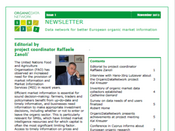Editorial by Raffaele Zanoli to the first Newsletter of the OrganicDataNetwork projct
The United Nations Food and Agriculture Organisation (FAO) has observed an increased need for the provision of market information and Market Information Services (MIS) in recent years.
Efficient market information is essential for sound decision-making: farmers, traders and policymakers benefit from up-do-date and timely information, and businesses need information to make appropriate investment decisions, including whether or not to enter or leave the organic sector. This is particularly relevant for SMEs, which have limited market intelligence resources and for which capital is often the most significant limiting factor. Access to timely information on prices and quantities plays a crucial role in reducing the risk of losing money on a market transaction, and this applies to farmers, traders and consumers. Policy makers need information to determine the appropriate levels and nature of regulation and support measures.
Market information can be regarded as a public good, particularly for the numerous SMEs which are unable to pay for information. The rationale for running public Market Information Services and for providing statistical data is based on the fact that lack of information can lead to sub-optimal functioning of markets through information asymmetry, absence of transparency (particularly in price setting) and increased costs and investment risks. The availability of timely and accurate information to all interested parties is therefore essential, whether it be provided by the government itself or by the private sector. Unfortunately, Market Information Services are quite costly and increasingly become targets of budget cuts in a world of spending reviews and diminishing public resources.
In the rapidly changing global environment, the organic sector has now developed to the point where the need for improvement in statistical data is becoming particularly pressing, and the consequences of failing to address these needs are potentially significant in financial terms for organic businesses.
We launched the OrganicDataNetwork with two primary reasons in mind. Firstly, without transparency, the European market for organic food will face increasing asymmetries, and all stakeholders will be somewhat affected. Secondly, better availability of market intelligence will lead policy makers and organic market actors involved in organic markets to better decision-making. The availability of timely and accurate market information on organic markets may encourage market entry and make the market more competitive and more efficient.
In implementing the OrganicDataNetwork, we pursue the following key objectives:
1. To bring together stakeholders and bodies actively involved in organic market data collection and publication and review the needs of end-users with respect to organic market data.
2. To provide an inventory of relevant private and public bodies that are involved with the collection, processing and dissemination of organic market data in the European Union, the Candidate countries, the Potential Candidate and the EFTA countries;
3. To classify existing methods of organic market data collection and analyse their suitability and compatibility and develop criteria for quality improvement of available data.
4. To collect, store in a common format and provide access to currently available data on organic markets in Europe.
5. To develop and test common methodologies to assess the consistency of national data, with special reference to available data on trade flows.
6. To test innovative approaches to improve the data collection and market reporting in six case study regions.
7. To disseminate project results and develop recommendations including a code of practise for organic market data collection and a proposal for a future European organic data network beyond the conclusion of the project.
We therefore invite all those directly or indirectly involved in organic Market Information Services provision to contribute to our project via the numerous tools our stakeholder involvement platform provides. As a first step, please take two minutes to register on our website to receive our newsletter, information about our workshops, and updated information on our progress in enhancing organic Market Information Services at the European level. And, if you want to contribute more, please post your opinions on our online forum, and actively participate in the network by proposing topics and issues to be considered in order to make organic market information more accurate, more relevant and more available.
Thank You!
Prof. Raffaele Zanoli
Coordinator,
OrganicDataNetwork
Contact
Prof. Dr. Raffaele Zanoli
Università Politecnica delle Marche
Via Brecce Bianche
60131 Ancona
Italy
Tel. +39 071 2204929
zanoli(at)agrecon.univpm.it
www.univpm.it
 This website was archived on January 11, 2020 and is no longer updated.
This website was archived on January 11, 2020 and is no longer updated.
